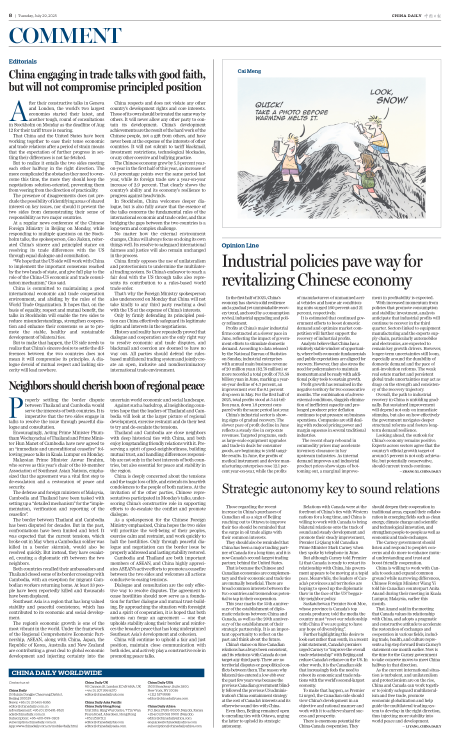Those regarding the recent increase in China's purchases of Canadian oil as a sign of Beijing reaching out to Ottawa to improve their ties should be reminded that the surge in oil trade aligns with their common interests.
They should also be reminded that China has been a major trading partner of Canada for a long time, and it is now Canada's second-largest trading partner, behind the United States.
That is because the Chinese and Canadian economies are complementary and their economic and trade ties are mutually beneficial. There are broad common interests between the two countries and tremendous potential to tap in their cooperation.
This year marks the 55th anniversary of the establishment of diplomatic relations between China and Canada, as well as the 20th anniversary of the establishment of their strategic partnership. It is an important opportunity to reflect on the past and think about the future.
China's stance on Sino-Canadian relations has always been consistent, and its relations with Canada do not target any third party. There are no territorial disputes or geopolitical conflicts between them. The reason why bilateral ties entered a low ebb over the past few years was because the previous Canadian government blindly followed the previous US administration's China containment strategy at the cost of Canada's interests and its otherwise sound ties with China.
Even then, Beijing remained open to mending ties with Ottawa, urging the latter to uphold its strategic autonomy.
Relations with Canada were at the forefront of China's ties with Western nations for a long time, and China is willing to work with Canada to bring bilateral relations onto the track of sound and steady development and promote their steady improvement, Premier Li Qiang told Canadian Prime Minister Mark Carney when they spoke by telephone in June.
But although Carney told Premier Li that Canada is ready to restart its relationship with China, his government appears to be moving at a tepid pace. Meanwhile, the leaders of Canada's provinces and territories are hoping to speed up the diplomatic thaw in the face of the US' beggar-thy-neighbor policy.
Saskatchewan Premier Scott Moe, whose province is Canada's top canola producer, told the media the country must "reset our relationship with China if we are going to have any hope of diversifying".
Further highlighting this desire to look east rather than south, in a recent joint statement, Canada's premiers urged Carney to "improve the overall trade relationship" with Beijing and reduce Canada's reliance on the US. In other words, it is the Canadian side that increasingly feels the need to reboot its economic and trade relations with the world's second-largest economy.
To make that happen, as Premier Li urged, the Canadian side should view China's development in an objective and rational manner and work with it to achieve shared success and prosperity.
There is enormous potential for China-Canada cooperation. They should deepen their cooperation in traditional areas, expand their collaboration in emerging fields such as clean energy, climate change and scientific and technological innovation, and strengthen people-to-people as well as economic and trade exchanges.
The Carney government should listen and respond to people's concerns and do more to enhance mutual understanding and trust and boost friendly cooperation.
China is willing to work with Canada to seek and expand common ground while narrowing differences, Chinese Foreign Minister Wang Yi told his Canadian counterpart Anita Anand during their meeting in Kuala Lumpur, Malaysia, earlier this month.
That Anand said in the meeting that Canada values its relationship with China, and adopts a pragmatic and constructive attitude to accelerate the restoration of exchanges and cooperation in various fields, including trade, health, and culture represents a big step forward from Carney's statement one month earlier. Now is the time for the Carney government to take concrete moves to meet China halfway in that direction.
As the current international situation is turbulent, and unilateralism and protectionism are on the rise, China and Canada can work together to jointly safeguard multilateralism and free trade, promote economic globalization and help guide the multilateral trading system to develop in the right direction, thus injecting more stability into world peace and development.

